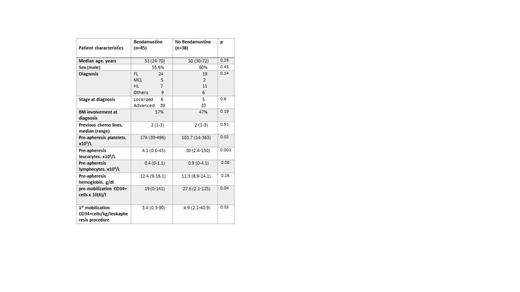Abstract
Introduction:
Bendamustine is a hybrid alkylating agent with high efficacy in different haematological malignancies, especially for lymphomas. Data about the capacity of peripheral blood stem cell (PBSC) mobilization or a possible stem cell toxicity after the use of bendamustine are unclear, with sufficient number of PBSC after bendamustine- rituximab (B-R) combination used in first line but with scarce information in relapse, especially with the use of bendamustine immediately before mobilization. The aim of this study was to evaluate the influence on PBSC mobilization of bendamustine as the last previous regimen used before the collection of PBSC.
Methods:
This is a retrospective, multicentre study, which includes patients from 8 different GELTAMO centres in Spain. Forty-eight lymphoma patients who received bendamustine followed immediately by stem cell mobilization (SCM) were included. A single-centre control group of consecutive patients was included, matched by histology, age and number of previous lines; HIV+ patients were excluded.
Results:
We included 83 patients, 45 in the bendamustine group and 38 in the control group. Table 1 shows patient´s characteristics. Both groups are adequately balanced. No patients received previous lenalidomide, and none patient had previous transplant. In the bendamustine group, the median number of cycles administered was 4 (range 2-6). In 8 patients of the bendamustine group and 12 in the control group the mobilization was programmed after first-line treatment. In the remaining cases, mobilizations were performed after 1 st or 2 nd relapse treatment.
In most of the patients, the mobilization regimen was performed only with G-CSF, although 7 patients in the control and 3 patients in bendamustine groups received alternative regimens such as ESHAP, DHAP or ICE. Ten patients in the bendamustine group received plerixafor as part of the 1 st attempt mobilization regimen.
Median number of apheresis with the first attempt of mobilization was 1.5 in the bendamustine group vs 1.3 in the control group. In bendamustine group 8 patients didn't go to apheresis due to a low pre-mobilization CD34+ cell count in peripheral blood, compared with 2 patients in control group. Median pre-mobilization CD34+ cells and median number of mobilized CD34 cells obtained was significative lower with in bendamustine group (Table 1). Moreover, 10 patients in this group didn't mobilized with 1 st attempt (and in 4 of them and neither with the second mobilization attempt), compared with only 2 in the control group.
Mobilization failure in the bendamustine group was more frequent in certain lymphoma subtypes (among the 10 failures, HL and FL were the most frequent, 40%, p=0.07, and 50%,
p=0.051 respectively), and was also associated with number of previous lines of therapy (HR 4,1; p= 0.041), since 90% of the failures were patients mobilized at relapse, and only 1 as 1st line consolidation. No relationship was found between stage, doses, or number of cycles of bendamustine administered.
Conclusion:
Our results show that the collection of sufficient numbers of PBSC could be affected by the use of bendamustine immediately prior to mobilization, especially in more pre-treated patients. We continue working on expanding our series to confirm these results.
Bastos-Oreiro: Kite: Speakers Bureau; Gilead: Honoraria; BMS-Celgene: Honoraria, Speakers Bureau; Janssen: Honoraria, Speakers Bureau; F. Hoffmann-La Roche: Honoraria, Research Funding, Speakers Bureau; Takeda: Speakers Bureau; Novartis: Honoraria, Speakers Bureau. Salar: Roche: Consultancy, Speakers Bureau; Gilead: Research Funding; Janssen: Consultancy, Speakers Bureau; Celgene: Consultancy, Speakers Bureau. Sancho: Roche, Janssen, Celgene-BMS, Gilead, Novartis, Takeda: Honoraria, Speakers Bureau; Roche, Janssen, Celgene-BMS, Gilead, Novartis, Incyte, Beigene: Speakers Bureau.


This feature is available to Subscribers Only
Sign In or Create an Account Close Modal